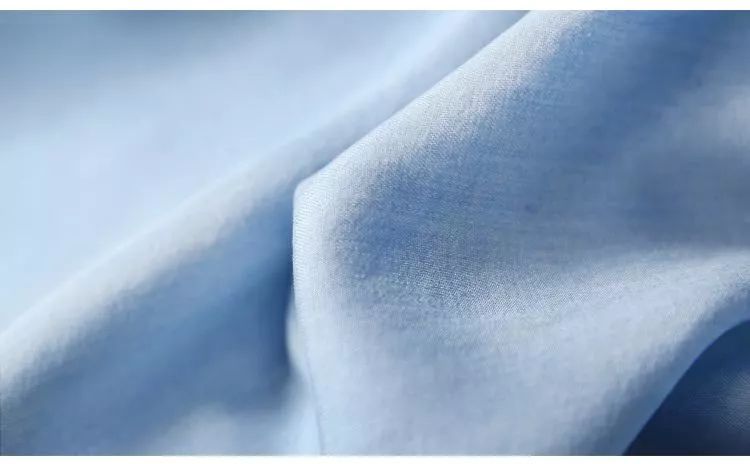Recycled fiber fabric takes natural cellulose (cotton, hemp, bamboo, trees, shrubs) as raw materials, does not change its chemical structure, but only changes the physical structure of natural cellulose, so as to produce regenerated cellulose fiber with better performance.
Its structural composition is similar to that of cotton, but its moisture absorption and air permeability are better than that of cotton fiber.
Recycled fiber fabric can be said that it is the best moisture absorption and air permeability among all chemical fibers. It is known as “breathing fabric”.
At the same time, it also has some advantages of silk that cotton fiber does not have.
Therefore, it is more comfortable to wear; Dyeing beauty is better than cotton fiber; Feel soft, plump, smooth, with excellent drapability and silk like luster.
High thermal stability and light stability, no static electricity; Strength and elongation can meet the needs of most textiles. It has good spinnability.
Staple fibers can be pure spun or blended with other textile fibers.
The fabric is soft, smooth, breathable, comfortable to wear, bright color and good color fastness after dyeing.
It is suitable for making underwear, coats and various decorative articles.
The recycled fiber fabric product is a kind of environment-friendly “green” fiber with excellent performance, which takes natural plant fiber as raw material, 100% pure natural material, natural biodegradation, no addition, no heavy metals, no harmful chemicals, and no irritation to skin.
There are active hydroxyl groups in cellulose molecules, so that all links in the production of recycled fiber fabric can be grafted and copolymerized with many other molecules for combination modification, which provides a broad space for the development of various high and new technologies in recycled fiber fabric.

Why is there such a recycled fiber fabric?
Due to the decrease of cultivated land and the depletion of oil resources, the output of natural fiber and synthetic fiber will be more and more restricted.
While paying attention to the environmental protection performance in the process of textile consumption, people have re recognized and explored the value of regenerated cellulose fiber.
Nowadays, the application of recycled fiber fabric has obtained an unprecedented development opportunity.
Regenerated cellulose fiber is actually a general term of a large category, such as lessel fiber, modal fiber, bamboo charcoal fiber, copper ammonia fiber, etc.
Generally speaking, they are all recycled fiber fabric.
Some clothes signs write recycled fiber fabric, and the actual composition is mixed with two or more of the above fibers, so they are collectively referred to as regenerated cellulose fiber.
Simply speaking, recycled fiber fabric reprocesses the original cellulose of plants into textiles.
If you are an ordinary consumer, you can’t distinguish the fabric composition.
Sometimes even professionals need testing equipment to know the specific composition. So when you buy clothes, don’t be confused by the concept.
What are the advantages of recycled fiber?
Breathable and cool – recycled fiber fabric fabric has good air permeability and is known as “breathing fabric”.
It will not feel muggy in summer. Its air permeability is better than that of pure cotton fabric.
It is an ideal close fitting fabric and health clothing product, which is conducive to human physiological cycle and health.
Moisture absorption and perspiration – the basic chemical composition of recycled fiber fabric is the same as that of cotton fiber.
Therefore, some of its properties are close to those of cotton fiber.
The difference is that its moisture absorption and air permeability are better than those of cotton fiber. It can be said that it is the best one among all chemical fibers.
The moisture absorption of recycled fiber fabric is as high as 13% ~ 15%, which is 6% ~ 7% higher than that of cotton fiber.
It has good air permeability and moisture regulation functions and is more comfortable to wear.
Among the 12 main textile fibers, the moisture content meets the physiological requirements of human skin and is better than other fibers.
Skin friendly and comfortable – recycled cellulose fiber fabric feels soft, smooth and cool, and is not easy to generate static electricity.
It has the softness of cotton, the luster of silk and the smoothness of hemp.
Comfortable and close fitting, breathable, moisture absorption and good elasticity.
100% pure natural material, natural biodegradation, no addition, no heavy metals, no harmful chemicals, and no irritation to the skin.
Good dyeing performance – due to the strong moisture absorption of recycled fiber fabric, regenerated cellulose fiber is easier to color than cotton fiber, with pure color, gorgeous color fastness and the most complete chromatography.


